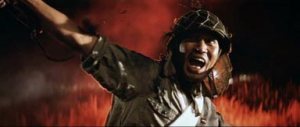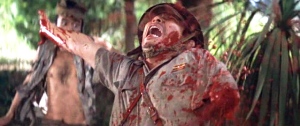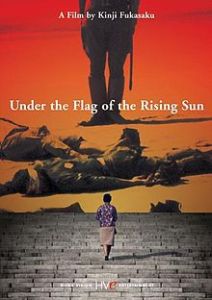Of all the films on this countdown, this is the movie that people have probably heard the least about.
The majority of these films are from America and Japan, with all but one of the Japanese films coming from critically acclaimed directors that most non-film buffs have heard of or are Godzilla films. This one is a relative unknown, but that is understandable.
When it comes to World War II, each country has its own interpretation of the events, as well as different feelings on the war. It makes talking about it quite personal, and difficult to discuss without looking it from your country's point of view. In America, we prospered after the war, even though the emotional toll was quite high. New and better technology was invented, the nation grew stronger and united, and we had seen the beginning of the baby boom era.
But what would about countries on the losing side of WWII? How did they fare after the war? Did their economy prosper or falter? How did they cope with the emotional toll? What did they do to survive losing a war?
Of all the films about World War II, Kinji Fukasaku's "Under The Flag Of The Rising Sun," leaves the biggest impact on me, because it takes a unique and stylized look at a side that is so often overlooked - the Japanese side of the war, and the aftermath it had on the Japanese people.
Fukasaku was known for directing films with an eccentric visual style, often using tilted camera angles and color filters, to give his movies a more dream-like state. Fukasaku had one of the longest careers in Japanese filmmaking, as he started in the early 1960s with small B-movies, moving up to direct many Japanese gangster (Yakuza) flicks, handled the Japanese segments of "Tora! Tora! Tora!" (a job that was initially given to legendary director Akira Kurosawa) and would end his career with one of the most outstanding films to come out of Japan, "Battle Royale" in 2001.
While "Battle Royale" is considered his masterpiece, "Under The Flag Of The Rising Sun" is more of a personal piece about the depths man will sink to during war, and how this has a continued effect long after the war has ended.
It has been 26 years since the end of World War II, and every year the Emperor of Japan visits the memorial to the nearly four million Japanese lives that perished during the war, but not all are accepted and appreciated. For example, the husband of Sakie Togashi (Sachiko Hidari) has been dead since 1945, but the cause of his death has been changed from killed in combat to execution, possibly because he mutinied against his superior officer. But because of the confusion at the end of the war, no one can be too sure of the legitimacy of those documents, meaning Sakie has wondered what killed her husband for 26 years and has never gotten an answer.

But thanks to a kind soul in the legal department, she is given the names of four surviving people in her husband's platoon that might be able to shed some light on what happened to him.
I like to think of this film as a combination of Stanley Kubrick's "Paths Of Glory" and Akira Kurosawa's "Rashomon." It has the same despicable and disgusting outlook on war as Kubrick's film, even down to officers executing their own kind for showing basic human traits and emotions in the heat of combat. That in war, we should remove our humanity and soul so that we can best serve our country, when that is impossible.
However, "Under The Flag Of The Rising Sun" has many more similarities to "Rashomon," as both films are about multiple eye witnesses recalling dire and drastic events, yet each person having completely different interpretations and coming to almost opposite endings, leading the audience to figure out which story is true and the others that must be false.
This gives "Under The Flag Of The Rising Sun" its own unique feel, as each story gives us a new perspective on the role that the war has played on the person. How their lives have been effected by it, and how they look back on these traumatic events. While there is room for doubt on each story, there is no hiding that Japan was crippled by WWII and is still hurt by it.

Japan is a nation dedicated to honor and loyalty to Japan. But in war, honor may mean something on an personal level, but on a grand scale honor and loyalty means nothing. According to this film, the Japanese soldiers believed the superiority of their country and way of life and that would lead them to victory. But as this war continued on, it was clear that it took more than dedication and honor to survive, let alone win.
During the battles that took place on New Guinea, the Japanese had roughly 12 working cannons, all of which were useless pieces of junk. It had gotten to the point where only 45 machine guns remained among the 800 troops, and the rest were forced to make spears out of bamboo against the heavily armed Americans and Australians.
And those were the soldiers that could actually stand up and fight, not counting the thousands of Japanese troops that died on the boats, were lost to the ocean, were never seen again while traveling through the mountains, or had died (or were dying) of starvation or malnutrition. Those rocky mountains had nothing eatable other than a few potatoes that were stolen from local villagers, which the soldiers would naturally fight over.

One point is made clear in this film - In that kind of environment, where supplies are gone, the enemy is beating down on you and you must fight to get even a scrap of food, how can one be honorable and loyal? Is sacrificing yourself to starvation proper to save Japan?
War brings out the disgusting parts of humanity, where "honor" means nothing.
We are given many war stories in "Under The Flag Of The Rising Sun," each more disturbing than the last, but all with a common theme throughout all - the need to survive, and the sacrifices that must be made. Each story has Sakie's husband as the main character, as he steals potatoes from his fellow troops, kills his friends to have something to eat, and plans the murder of his crazy superior officer who has gone mad with power.
Very little of this film is about the Japanese troops fighting the enemy, but rather themselves. Each survivor speaks of very little about what it was like to be in the heat of battle, and instead obsesses about what they were fighting for and that Japan would emerge as the strongest nation. But only to realize that Japan has since turned their backs on their soldiers, even forcing one survivor into a theater comic routine where he is a long forgotten soldier who thinks the war never ended.

This is still a big problem in Japan - the lack of respect for the older generation. Very often, the newer generation seems ungrateful to those who sacrificed their lives so that Japan could continue on. This now massive metropolis and economic power that risen up from two atomic bombs and bureaucratic collapse, insists on looking forward, never backwards. Another survivor is now a school teacher, and often wonders why he sacrificed his youth and innocence when these children don't care about that.
There are many terrifying images in "Under The Flag Of The Rising Sun," most of which are real photographs from the war of destruction and mutilated bodies. This makes the film one of the most brutally honest and unflinching depictions of WWII that I've seen, and certainly falls into its own class by being about a side of the war that isn't often looked at. With hauntingly beautiful cinematography that gives this a nightmare quality, "Under The Flag Of The Rising Sun" a terrifying portrayal of war that deserves much more attention.


No comments:
Post a Comment